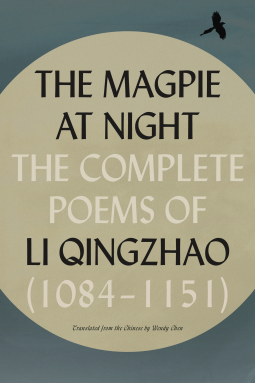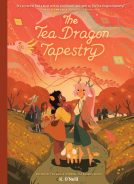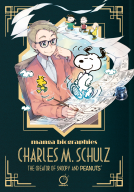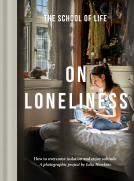
The Magpie at Night
The Complete Poems of Li Qingzhao (1084–1151)
by Li Qingzhao
This title was previously available on NetGalley and is now archived.
Send NetGalley books directly to your Kindle or Kindle app
1
To read on a Kindle or Kindle app, please add kindle@netgalley.com as an approved email address to receive files in your Amazon account. Click here for step-by-step instructions.
2
Also find your Kindle email address within your Amazon account, and enter it here.
Pub Date Feb 25 2025 | Archive Date Mar 25 2025
Description
A luminous new translation of the greatest woman poet in Chinese history, highlighting Li Qingzhao's iconoclastic verse and showcasing her visionary portrait of the inner workings of the artist’s mind.
The Magpie at Night is a lyrical and searching portrait of the inner life of Li Qingzhao, one of the greatest poets in Chinese literary history. These spare and arresting poems evoke with rare immediacy the quiet and haunting beauty of country life during the Song dynasty; the unseen, restive labor of the poet; and Li Qingzhao’s bracing and complex take on what it means to create art as a woman in the shadow of exile, war, imprisonment, and an unwelcoming literary establishment.
In Wendy Chen’s splendid new translation, each of Li Qingzhao’s ci—lyrics that were originally set to music—is as sharp and fresh as the edge of a new spring leaf. These richly textured bolts of melody tell a story that will resonate with scholars eager to restore this iconic figure to the canon of classical Chinese poetry, as well as with contemporary readers who will relate to the strikingly modern mode in which she delivers her wry, unsentimental, and bracing thoughts on art and posterity.
A Note From the Publisher
Advance Praise
“The Magpie at Night teaches us many a lesson of transformations: we learn that hair can 'grieve' and the water-clock is 'quiet,' we learn that the 'pot of spring' can 'break apart memory.' But most of all, we learn that poetry can survive the ravages of war and time, and after many centuries—thanks to Wendy Chen’s clarifying translations—the Song dynasty classic visits us in English. I am grateful for such transformations.” — Ilya Kaminsky, author of Deaf Republic
"Wendy Chen translates with a true poet's sensitivity to language, metaphor, and image. Indeed, to bring Li Qingzhao's poems to an English-speaking audience with such precision and obvious skill is a remarkable achievement. Here are poems as timeless as they are timely, as mysterious as they are rewarding." —Kristina Marie Darling, author of Daylight Has Already Come: Selected Poems
"Li Qingzhao's poems conjure the sound of rain on banana leaves, pale clouds 'smudging the moon,' the momentary solace of a dream, and how 'longing saturates the human world, / the heavens.' Her remarkable attention is gifted to us by Wendy Chen's remarkable acuity." —Michael Prior, author of Burning Province
"To read Li Qingzhao's work is to feel an intensity of spirit that says—even time cannot erase me. Wendy Chen's brilliant new translation ought to ensure that remains true. What heartache, what imagery, what absolute mastery there is in every line here." —John Freeman, author of Wind, Trees
Available Editions
| EDITION | Other Format |
| ISBN | 9780374612757 |
| PRICE | $18.00 (USD) |
| PAGES | 144 |
Available on NetGalley
Average rating from 24 members
Featured Reviews
Thank you to Netgalley and the publisher for providing me with an eARC of this poetry collection, however, all thoughts and opinions are my own.
Before seeing this on Netgalley I had never heard of Li Qingzhao and now I'm about to preorder this and see what other books I can hunt down. It's a new sort of niche interest I suppose, but I find Li Qingzhao's life equal parts interesting and tragic. I used to live in Hangzhou where she eventually settled at one point and now I wish I had known about her then. I'm sure that if I had shown an interest one of my students would have mentioned her, but I didn't know enough at the time. However, based on my Google Maps history I did visit her Memorial Hall/Pavillion while I was there. For me, it is both a miracle that so many of her poems survive, but also disappointing that more didn't.
Her poetry has a descriptive and yet ethereal quality to me. However, there is a distinct shift in tone from her earlier poetry to her later poetry. I wish that some of her essays survived, but in my research it seems that mostly only her ci form poetry survived. Wendy Chen does an excellent job giving us readers an overview of Li Qingzhao's life and poetry at the beginning of the book, but also for stoking the flames of curiosity to learn more.
Overall, I think that fans of classic Chinese poetry will probably have already read the poems here, but I this could be a chance to reexamine or compare. Fans of poetry looking to dip their toes into classic Chinese poetry will find this to be a friendly and enchanting place to start. I can't wait to get my hands on a copy of this for my shelf and to seek out some friends to go next to it. I also hope that Wendy Chen does more work either for Li Qingzhao or some other aspects of Chinese poetry/culture. I found her writing in the beginning to be clear, concise, and educational.
A fascinating bundle of poems of an 12th century female poet. Li Qingzhao her work is full of nature depictions and melancholy, and feels remarkably modern at times
Now, I can no longer embrace
anything near the past.
Idle, I have doubts numerous
as moonbeams.
- Fragrant Courtyard, a Modulation
I had never heard of Li Qingzhao before, a Song dynasty poet, finally translated by a female scholar and poet Wendy Chan.
The life of Li Qingzhao is fascinating. Displaced (and losing an acclaimed library and antiquities collection) by the fall of the Northern Song, losing her husband Zhao Mingcheng to dysentery.
Being physically abused by her second husband, who she got convicted and exiled for corruption. However women who brought their husbands to court where jailed, imprisonment only her late husband’s familial ties could help her escape of.
Even in her later years her talent is clear, with records of her presenting poems to the court of the emperor, even though in her poems she was critical of the abandonment of the Northern Song lands.
I also learned a lot about Chinese poetry in its many forms. Ci, poems set to music meters, wen, essays and shi, political writings, are some of the types of works Li Qingzhao produced.
Her poems are very visual and vivid, evoking both natural and domestic settings.
Seasons, passage of time, wine, plum blossoms and migrating birds appear often. Many festivals mark the passage of time. Tranquility and transience for main grounding themes in the grouping Wendy Chan made, ranging from initially more light and spring oriented poems to more wintery, melancholy ones at the end of the bundle.
An interesting bundle from a woman who lived through extraordinary times, skilfully brought to life for a modern audience.
Poems:
Do not resent their vanishing
fragrance, their falling
jade petals.
Have faith feelings will remain
when all traces have been swept away.
- Fragrant Courtyard
Longing saturates the human world,
the heavens.
A stair of clouds to the moon.
A thousand locked gates.
- Offering Incense
A breeze blows in
misty rain.
The pear blossoms want
to wither.
I fear
I cannot stop them.
- Silk-washing Stream
I fear our bitter parting,
your absence.
Still so much
I want to say
but cannot.
- At Phoenix tower remembering the tune of the flute
Who will drink with me
from wine and poems?
Tears ruin
the powder on my face.
- Butterflies long for the flowers
My journey is long, I say
and the sun is setting.
I have studied poetry
and attempted startling phrases
to no use.
- The Fisherman’s Pride
Soft wind. Pale sun.
Spring is just beginning.
I feel good
in my lined jacket.
But rising from sleep,
I am a little cold.
The plum blossoms in my hair
have withered.
Where is my homeland?
Only drunk can I forget.
The incense burning while I sleep
is gone when I awake.
Still, more wine remains.
- Barbarian Bodhisattva
 Lisa D, Reviewer
Lisa D, Reviewer
When I studied Chinese language and history, I had a professor who said that she wasn't allowed to cover art and poetry in the history classes because of their social science designation. And then she did it anyway, exposing us to these beautiful works in context of the historical times. That was where I got the appreciation for this kind of poetry, which is deceptively simple.
This is a collection by an author I was unfamiliar with. Reading ger descriptions of nature is relaxing, but the words and perception are so sophisticated and intelligent. It's amazing to think that I can relate this much to someone from that far away and that long ago.
Her life was really interesting too, and it seems as though she was a strong, interesting lady.
Thanks to NetGalley for letting me read this
 Edie C, Reviewer
Edie C, Reviewer
"The feelings I make into poems
are like the magpie at night,
circling three times, unable to settle."
I want to be the sort of person who already knew of Li Qingzhao and was familiar with her poetry. But, alas, I am not. Which is why I found the introductory material interesting and informative. Also, the notes at the end were invaluable for understanding the poems. The poetry itself was both completely foreign to me - different time, place, and culture - and beautiful. I admit I don't have the background necessary to fully understand the poems, even with the supplemental material provided in the book. But there were lines which sliced through space and time to land in my heart like an arrow from an almost mythical past. Thank you to Wendy Chen for the translation, and Farrar, Straus and Giroux, and NetGalley for the eARC.
"Who will drink with me
from wine and poems?"
 Bill C, Reviewer
Bill C, Reviewer
I can’t speak to the quality of Wendy Chen’s translations in The Magpie at Night: The Complete Poems of Li Qingzhao, neither reading nor speaking Chinese. And not being a scholar of Chinese literature, or just a great reader, I have no basis for comparison in relation to past translations. Best I can do therefore, is simply review the book as I experienced the poems themselves. I’ll leave it other far more versed/learned in the field and/or the language to comment on accuracy, stylistic changes, etc.
As for the experience, I thoroughly enjoyed this collection, finding myself frequently moved by image and tone. Chen offers up a welcome prologue giving the reader some background and context on Qingzhao’s life and more generally on Chinese poetry of the time. She also explains a few of her translator decisions, such as which poems to include (the number of “accepted” poems varies greatly amongst academics) and her perhaps controversial choice to eschew the “common practice in ancient Chinese poetry” of not employing an explicit first-person. Wen instead uses first (and third) person pronouns in hope that it “helps create poems that sound more natural to English readers . . . and facilitates a glimpse into the life of a woman in Li Qingzhao’s position.” I certainly found the “I” of the poems created a sense of intimacy with the speaker that enhanced the emotional impact of many of the poems both singly and cumulatively.
Finally, with regards to the text outside of the poems, Chen closes with an appendix of notes that explain the various allusions in the works, such as to historical events/personages, myths, cultural elements like festivals, traditional symbolic meanings of certain elements such as flowers or winds, and references to other poets and their work. I’m glad Chen chose this route rather than use footnotes or margin notes as this way we get to enjoy the poems on their own, as their own work. I read the collection through then reread after perusing the notes. Yes, the notes made me more informed about the poems, but I still was happy I came to them first wholly innocent of the illusions and without the temptation of interrupting a read by glancing at a note.
The poems themselves tend to the short, with a few exceptions, with a focus on brief moments caught in images and expressions of emotional state of mind. Especially toward the end there’s a sense of grief and loss, a mourning of time’s passage, while throughout the collection there’s always a strong expression of longing in all its forms, the element that moved me the most in individual poems and in the slow accretion over the length of the collection. There’s a grace and ease to many of the poems and a nice understated use of sound, while the images stand out in their stillness and moments of precision. A highly recommended collection. I’ll end with a few favorite passages:
“A Cutting of Plum Blossoms”
Flowers, by themselves, fall.
Water too runs alone.
One shared longing,
Parted between two.
Unrelenting, it falls
From the brows, only to rise
In the heart.
“At Phoenix Tower”
I am too listless
To comb my hair
And indifferent
To the dust on the mirror …
Only the running stream before me
Keeps me company.
From now on, where I gaze,
Pour a wash of new sorrows.
“The Fisherman’s Pride”
I have studied poetry
And attempted startling phrases
To no use.
“The feelings I make into poems”
The feelings I make into poems
are like the magpie at night,
circling three times, unable to settle.
Readers who liked this book also liked:
L.M Montgomery
Children's Fiction, Comics, Graphic Novels, Manga, Teens & YA
Yuzuru Kuki
Biographies & Memoirs, Children's Nonfiction, Comics, Graphic Novels, Manga
JUNO
Arts & Photography, Comics, Graphic Novels, Manga, Travel
Silvia Moreno-Garcia
Historical Fiction, Literary Fiction, Sci Fi & Fantasy
We Are Bookish
Sci Fi & Fantasy, Teens & YA


















